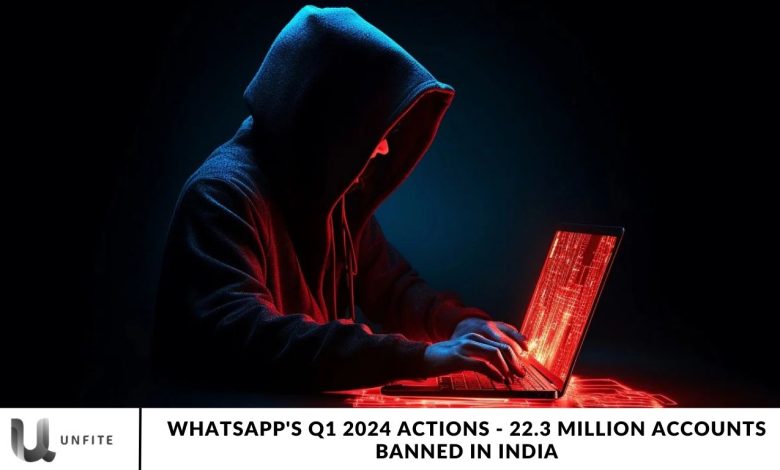WhatsApp’s Q1 2024 Actions – 22.3 Million Accounts Banned in India

WhatsApp proactively addressed the growing issue of online scams by banning 22.3 million accounts in India. 📊 Recent reports indicate that these accounts were involved in fraudulent activities, highlighting the alarming rise of online scams and the significant threat they pose to user safety. ⚠️
This substantial ban underscores the urgent need for enhanced security measures to protect users from fraud. 🔒 In this article, we will delve deeper into the reasons behind WhatsApp’s decision to ban 22.3 million accounts in India and explore the implications of these actions in the fight against online scams. 🕵️♂️💡
WhatsApp banned 22.3 million accounts in India in Q1 2024
WhatsApp took significant action by banning over 2.23 crore accounts in India! 🎉 This figure is double the number of bans compared to the same period last year (2023). 📊
Such a massive crackdown by WhatsApp highlights the growing concerns surrounding online fraud and user security in India. 🚨🔒
These bans were implemented based on user complaints, suspicious activities detected by WhatsApp’s systems, and the identification of accounts that violated Indian laws or WhatsApp policies. 📜 The company also followed the guidelines set by the Grievance Appellate Committee (GAC). 👥
WhatsApp clarified that these actions were carried out under Rule 4(1)(d) and Rule 3A(7) of the Information Technology (Intermediary Guidelines and Digital Media Ethics Code) Rules, 2024, established by the Government of India. 🛡️
WhatsApp Release their monthly Report regarding banned accounts
WhatsApp highlighted a concerning trend: the number of banned accounts is increasing each month. 📅
WhatsApp removed over 67 lakh accounts 🚫, with approximately 13 lakh accounts identified and closed without any user complaints.
February continued this trend, as WhatsApp banned more than 76 lakh accounts 🔍, including over 14 lakh accounts that were caught before any user complaints were filed.
By March, the figures rose even further, with WhatsApp banning about 80 lakh accounts 📊—of which more than 14 lakh were already activated.
The consistent increase in monthly bans and WhatsApp’s proactive efforts to identify accounts independently demonstrate the platform’s commitment to preventing misuse and enhancing user security. 🔒
Why did WhatsApp Decide to Ban Accounts?
WhatsApp states that it banned these accounts due to violations of its rules and threats to users’ privacy. 🚫🔒 For instance, many of these accounts were involved in spreading fraud or spam.
The ban of such a large number of accounts highlights the significant misuse of the platform, particularly in India, where WhatsApp boasts over 53 crore active users. 📱🇮🇳
As part of the Meta company, WhatsApp encourages its users to review its “Acceptable Use of Our Services” guidelines to better understand acceptable behavior on the platform. 📜✨
WhatsApp also emphasizes account security, urging users to report any unauthorized access or suspicious activities. 🚨👀
With 22.3 million accounts banned in India, all of us must take responsibility for safeguarding our accounts against scams. Taking the necessary steps to secure your account is essential! 🛡️🔐
Overview of WhatsApp’s Actions in Q1 2024

Record-Breaking Bans
In the first quarter of 2024, WhatsApp took decisive action against misuse on its platform by banning a staggering 22.3 million accounts in India! 🚫🇮🇳 This figure represents a significant increase compared to previous quarters, highlighting the platform’s intensified efforts to combat fraudulent activities.
- January 2024: WhatsApp banned over 6.7 million accounts 🔒, signaling early signs of misuse in the new year.
- February 2024: The trend continued, with the platform enforcing bans on more than 7.6 million accounts 📊. This month saw an increase in proactive measures taken against suspicious activities.
- March 2024: The total rose sharply to approximately 8 million accounts 🚀 banned, marking the highest monthly figure for the quarter.
When compared to the last quarter of 2023, where around 11 million accounts were banned, the Q1 2024 numbers reflect a 100% increase 📈, showcasing WhatsApp’s commitment to user safety and platform integrity. The trend suggests a growing recognition of the risks associated with online communication, particularly in a market as large as India, which has over 530 million active WhatsApp users. 📱
Reasons Behind the Bans
The primary reasons for these record-breaking account bans can be attributed to various violations of WhatsApp’s terms of service, focusing mainly on fraudulent behavior and the dissemination of spam. 🚨
- Fraudulent Activities: Many banned accounts were involved in schemes aimed at deceiving users for financial gain 💰. These scams often included fake offers, phishing attempts, and identity theft, posing severe risks to user privacy and economic security.
- Spam Distribution: A significant portion of banned accounts was found to be sending unsolicited messages 📩 promoting products or services without consent, which disrupts the user experience and contributes to a toxic environment on the platform.
WhatsApp employs a combination of user reports and sophisticated internal monitoring systems to detect and act on violations. User complaints play a crucial role in identifying suspicious accounts; however, WhatsApp also utilizes advanced algorithms to analyze patterns of behavior that indicate misuse. 🔍 This proactive approach not only helps in addressing reported concerns but also in preventing potential fraud before users are affected. By banning these accounts, WhatsApp aims to create a safer environment for its users, reinforcing its commitment to privacy and security in digital communication. 🔐
The Rising Threat of Online Scams in India
Current State of Online Fraud
Online fraud has reached alarming levels in India, with reports indicating that over 50% of internet users have encountered some form of online scam. 📊 In 2023 alone, the country witnessed a staggering ₹16,000 crore ($2 billion) lost to various online scams, with WhatsApp being a primary platform exploited by fraudsters. 💸
- WhatsApp Specific Statistics: According to recent surveys, more than 30% of users have reported receiving fraudulent messages on WhatsApp, with scams ranging from fake job offers to unsolicited financial schemes. 🚫 This alarming trend has made WhatsApp a hotspot for scammers, prompting the platform to take strict actions against fraudulent accounts.
The impact of these scams extends beyond financial loss; they can lead to significant emotional distress and erosion of trust in digital communication. Users often find it challenging to differentiate between legitimate communications and scams, resulting in increased anxiety and caution when using messaging platforms. 😟
User Safety Concerns
The rise in online scams poses severe risks to user privacy and security. 🚨 As fraudsters employ increasingly sophisticated tactics, users may inadvertently share personal information, leading to identity theft or financial exploitation.
- Impact on User Privacy: Scammers often impersonate trusted contacts or reputable businesses, tricking users into revealing sensitive information. 🕵️♂️ Once obtained, this information can be used for fraudulent activities, putting users at significant risk.
- Recent Incidents: Recent reports highlight alarming cases where users lost substantial amounts of money through WhatsApp scams. For instance, in early 2024, several users fell victim to a scam where fraudsters posed as tech support, leading them to disclose banking details under the guise of resolving account issues. 💳
Additionally, the increase in phishing attempts on WhatsApp has raised red flags. 🚩 Scammers often send links that appear legitimate, prompting users to enter personal information on fake websites. As users become more aware of these threats, trust in platforms like WhatsApp may wane, underscoring the necessity for enhanced security measures and user education. 📚
WhatsApp’s Commitment to User Security

Guidelines for Safe Usage
WhatsApp has established clear guidelines under its “Acceptable Use of Our Services” to promote a safe and secure environment for all users. 📜 Here are some key points from these guidelines:
- No Spam or Fraud: Users are prohibited from sending spam, including unsolicited promotional messages or fraudulent content. 🚫 Always ensure your messages are intended for recipients who have consented to receive them.
- Respect Privacy: Users should respect the privacy of others by not sharing personal information without consent. This includes avoiding sharing contact details, photos, or videos without permission. 🔒
- Account Security: WhatsApp advises users to enable two-step verification to add an extra layer of security to their accounts. This feature requires a PIN when registering your phone number with WhatsApp again. 🔑
Tips for Securing Your Account:
- Use Strong Passwords: Protect your account with a strong password and avoid using easily guessable information. 🔐
- Be Cautious with Links: Avoid clicking on suspicious links or downloading attachments from unknown contacts. They may lead to phishing sites or malware. ⚠️
- Keep the App Updated: Regularly update WhatsApp to benefit from the latest security features and patches. 📱
Reporting Mechanisms
If users encounter suspicious activity or unauthorized access to their accounts, it’s crucial to report these issues promptly. Here’s how:
- Reporting Suspicious Activity: Users can easily report spam or fraudulent messages by tapping on the message, selecting the “Report” option, and following the prompts. 📲 This helps WhatsApp identify and take action against malicious accounts.
- Unauthorized Access: If you suspect someone else is using your account, immediately log out from all devices. 🚪 WhatsApp can assist in securing your account further if needed.
WhatsApp’s Support Resources:
- Help Center: WhatsApp offers a comprehensive Help Center where users can find answers to common questions and detailed guides on account security. 📖
- Contact Support: Users can reach out to WhatsApp support directly through the App for assistance with security concerns. Just go to Settings > Help > Contact Us for personalized support. 📞
Frequently Asked Question
Why did WhatsApp ban 22.3 million accounts in Q1 2024?
WhatsApp banned these accounts primarily due to violations of its policies, including the spread of spam and fraudulent activities. The actions aim to protect users from online scams and ensure a safe messaging environment.
How does WhatsApp identify accounts to ban?
WhatsApp uses a combination of user complaints, automated detection systems, and reports of suspicious activity to identify accounts that violate its terms of service.
Is this number of banned accounts higher compared to previous years?
Yes, the 22.3 million accounts banned in Q1 2024 represent a significant increase compared to the same period in 2023, indicating a growing concern over online fraud in India.
What types of scams are most commonly reported on WhatsApp?
Common scams include phishing attempts, fake job offers, lottery fraud, and unsolicited financial schemes. These scams often target unsuspecting users to steal personal information or money.
What steps can users take to secure their accounts?
Users can enhance their account security by enabling two-step verification, using strong passwords, avoiding suspicious links, and regularly updating the app.
How can users report suspicious activity on WhatsApp?
Users can report spam or fraudulent messages by tapping the message, selecting the “Report” option, and following the prompts. They can also report unauthorized access via WhatsApp’s support features.
What happens after a user reports an account?
Once a report is submitted, WhatsApp reviews the reported account and may take necessary actions, such as banning or restricting the account if it is found to violate policies.
What are the implications of these bans for WhatsApp users in India?
The bans are intended to create a safer environment for users by reducing the prevalence of scams and protecting personal information. Users can feel more secure while using the platform.
Conclusion
WhatsApp’s decisive action in banning 22.3 million accounts in India during the first quarter of 2024 underscores the platform’s commitment to enhancing user safety and combating online fraud. This significant increase in account bans reflects the rising challenges of digital scams and the need for robust measures to protect users. By implementing stringent monitoring systems and responding to user complaints, WhatsApp aims to create a secure messaging environment for its over 530 million users in India.
As online threats continue to evolve, users must remain vigilant and proactive in safeguarding their accounts. By following WhatsApp’s guidelines, enabling security features, and reporting suspicious activity, users can contribute to a safer online community. Ultimately, these collective efforts can help ensure that WhatsApp remains a trusted platform for communication in India and beyond.




